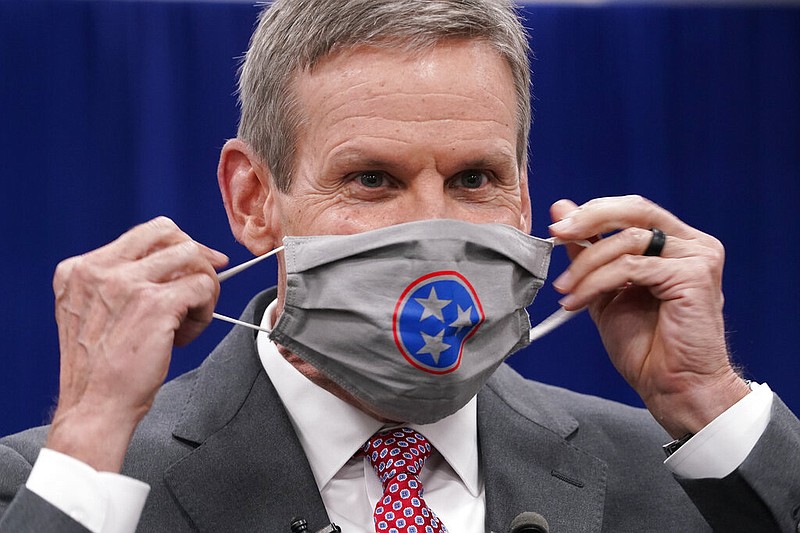NASHVILLE - Legislative Republicans want to place new restrictions on Tennessee governors' ability to extend emergency orders to address the COVID-19 pandemic as well as future health crises, saying extensions should require the General Assembly's specific approval.
But first, the Republican-led House and Senate will need to resolve differences in their respective approaches that surfaced Tuesday in the final meeting of their "Ad Hoc Committee to Study Emergency Powers."
GOP representatives and senators insist their effort isn't aimed at fellow Republican Gov. Bill Lee. The governor has issued and extended a series of executive orders, some of them controversial, to address the COVID-19 pandemic since the first known coronavirus case appeared here last March.
"I believe the governor has provided measured, steady leadership through this pandemic," said Rep. Jason Zachary, R-Knoxville, in response to a Democratic lawmaker's questions as to whether Zachary and GOP colleagues believe there has been "overreach" by Lee.
One of the recommendations seemingly agreed to by both House and Senate Republican panel members - minority Democrats opposed the entire plan, with Rep. Johnny Shaw of Bolivar questioning whether GOP colleagues were seeking to "micro-manage" a pandemic - is that no law goes into effect "until after [the] current administration leaves" in January 2022.
But as to whether that might impact Lee if he seeks reelection as many expect, House spokespeople didn't immediately respond to a Times Free Press inquiry. A Senate spokeswoman said, "the recommendation is at the end of the current Lee administration, regardless of when his term of office ends."
Asked what the governor thinks of all this, Lee spokesman Gillum Ferguson wrote in an email that "we're aware of the recommendations and will give them due consideration."
In fact, lawmakers said Lee is already doing more to provide them with advance notice on what he's planning in terms of executive orders and extensions.
Meanwhile, there are other differences in the two chambers' approaches.
For example, the House proposal says a health-related state of emergency expires after more than 60 days unless the General Assembly approves in session to continue it. If not in session, a "legislative council" could extend it for 15 days.
Senators' proposal has a more generous provision, giving the effect of an order 100 days before expiring.
Both chambers agreed on a provision requiring the governor provide lawmakers advance notice on his executive orders.
Senators and representatives also agreed not to include a governor declaring states of emergency for natural disasters such as this year's tornadoes, which swept Middle and Southeast Tennessee, including Chattanooga.
But they parted ways over what powers they will have outside of a legislative session, with the House saying the legislative council may stay a State of Emergency Order or executive order after 30 days following a five-day review.
Senators' version says it can do so only by lawmakers calling themselves into a special session through a process requiring signatures from two thirds of the 99-member House and 33-member Senate. Once in, they can pass a joint resolution ending the order.
Following the meeting, Sen. Ferrell Haile, R-Gallatin, sought to minimize differences between the approaches.
"I have not heard any disagreement that we need to be doing something like this. What we don't want to do is make this a referendum on decisions that [Lee] has made. It's new territory, it's absolutely new territory. There's all kinds of discussions about masks. We're not interested in what decision he's made or has not made about masks. That's not what this is about. This is about 50 years down the road, how do they handle a similar situation."
Other bills restricting what can be done have already been filed. For example, Zachary has a controversial bill addressing Lee's decision to outsource decisions over mask requirements. Lee, who came under sharp criticisms from Republicans over his own mask mandates, handed the decision over to mayors in 89 of Tennessee's 95 counties with state-run health departments.
Some counties have mandates, while others don't.
But in six counties that have locally run health departments, Lee left the mask decision up to the local boards of health. That hasn't been an issue in Hamilton County, one of the six, where Republican Mayor Jim Coppinger has supported a mask mandate.
But there's a furor in Knox County as Mayor Glenn Jacobs has opposed the county board's mask mandate.
Other lawmakers are pushing legislation to ban COVID-19 vaccine inoculation requirements.
Contact Andy Sher at asher@timesfreepress.com or 615-255-0550. Follow him on Twitter @AndySher1.
